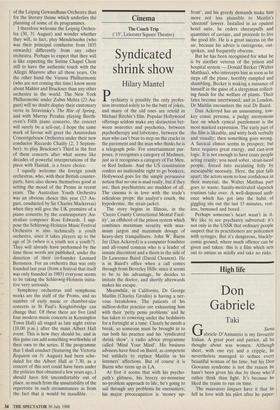Cinema
The Couch Trip (`15', Leicester Square Theatre)
Syndicated shrink show
Hilary Mantel
Psychiatry is possibly the only profes- sion invented solely to be the butt of jokes, and many of the old ones are retold in Michael Ritchie's film. Popular Hollywood offerings seldom make any distinction bet- ween neurotics and psychotics, between psychotherapy and lobotomy, between the man who can't bear to step on the cracks in the pavement and the man who thinks he is a telegraph pole. For entertainment pur- poses, it recognises a category of Madmen, just as it recognises a category of Fat Men, or Red Indians. And the US constitution confers no inalienable right to go bonkers; Hollywood goes for the simple persuasive notion that no one is mad really, but if they are, then psychiatrists are maddest of all. The cinema is in love with the trade's ridiculous props: the analyst's couch, the hypodermic, the strait-jacket.
The story begins in Illinois, in the `Cicero County Correctional Mental Facil- ity', an offshoot of the prison system which combines maximum security with max- imum jargon and maximum dosage of heavy-duty tranquillisers. John W. Burns Jnr (Dan Ackroyd) is a computer fraudster and all-round conman who is a leader of inmate discontent and a thorn in the side of Dr Lawrence Baird (David Clennon). He is in Baird's office when a call comes through from Beverley Hills; since it seems to be to his advantage, he decides to imitate the doctor, and shortly afterwards makes his escape.
Meanwhile, in California, Dr George Maitlin (Charles Grodin) is having a ner- vous breakdown. The patients of his million-dollar practice are exhausting him with their 'petty penis problems' and he has taken to cowering under the bedsheets for a fortnight at a time. Clearly he needs a break, so someone must be brought in to run both his practice and his 'syndicated shrink show', a radio advice programme called 'Mind Your Mind'. His business advisors have fixed on Baird, as competent but unlikely to replace Maitlin in his listeners' affections. But of course it is Burns who turns up in LA.
At first it seems that with his psycho- path's glibness, his breezy no-nonsense no-problem approach to life, he's going to sail through any problems he encounters; his major preoccupation is 'money up- front', and his greedy demands make him more not less plausible to Maitlin's `sleezoid' lawyer. Installed in an opulent hotel suite, he orders cheesepuffs and quantities of caviare, and proceeds to live the good life. He is a great success on the air, because his advice is outrageous, out- spoken, and frequently obscene.
But he has been recognised for what he is by another veteran of the prison and hospital system — Donald Becker (Walter Matthau), who intercepts him as soon as he steps off the plane; horribly rumpled and shambling, Becker is making a nuisance of himself in the guise of a clergyman collect- ing funds for the welfare of plants. Their fates become intertwined; and in London, Dr Maitlin encounters the real Dr Baird.
Dan Ackroyd has an unassuming, low- key comic persona, a pudgy anonymous face on which cynical puzzlement is the most marked expression. The early part of the film is likeable, and witty both verbally and visually; then something goes wrong. A farcical climax seems in prospect; but farce requires great energy, and cast-iron logic. It is not enough to have crazy people acting crazily; you need sober, strait-laced people, forced into escalating folly by inescapable necessity. Here, the plot falls apart; the actors seem to lose confidence in their material; the Walter Matthau part goes to waste; fuzzily-motivated slapstick routines take over. A well-disposed audi- ence which has got into the habit of giggling sits out the last 15 minutes, rest- less, bemused and bored.
Perhaps someone's heart wasn't in it. We like to see psychiatry subverted: it's not only in the USSR that ordinary people suspect that its practitioners are policemen with syringes. But it's dangerous, blackly- comic ground, where much offence can be given and taken: this is a film which sets out to amuse us mildly and take no risks.














































 Previous page
Previous page